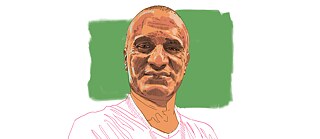by Anas Abdulsamad from Baghdad
Liberated Cities, Liberal Bodies

Anas Abdulsamad was born in 1974 in Baghdad. He obtained his BA in Theatre at the Fine Arts Academy of Baghdad. He currently serves as Director for Impossible Theatre. The group, composed of 16 actors, was formed in 1996 and works with body language as a medium for ideas instead of speech. The group has performed in many different countries and has won awards.
Liberated Cities, Liberated Bodies is a theatrical project funded by Spotlight Iraq. It was completed in the beginning of 2018 and performed in many cities across Iraq, including Baghdad, Basra, Kirkuk, Diyala, Fallujah and others. This project is based on workshops with people who have no particular acting experience. In each city, a group of youth is chosen and trained in acting for the show. They elaborate on their dreams and ideas during the workshop and translate these into a performance. The objective of the project is to break down gender apartheid in Iraq. Anas says that in the aftermath of the war, women withdrew from theatre due to the rise of tribal, religious and conservative norms. Even men have withdrawn from acting. In Basra, however, there was fortunately a high turnout from women who participated in the workshops and the play.
The play was performed for the public at the College of Arts in Basra. It was a huge success. In Fallujah, as in Basra, the workshop also attracted a significant number of women, even those wearing the niqab/hijab. It was a challenge overcoming the dominant religious atmosphere in Fallujah. In Diyala, Kirkuk and other cities, both the participation and performance saw success. Overall, there was an excellent reception of the project, and now many of those who participated have become trainers themselves, much to Anas’ satisfaction.
In each city where a workshop was hosted, the trainers advertised it, and then followed it with a theatre performance starring those who participated in the workshops. Anas also targeted more distant villages and border areas. The play lasted forty minutes and included music. It was performed in cities, villages, and public places. Participation was open to anyone with a desire to see their ideas and dreams realised and performed in this manner.
The concept of the project was inspired by the notable absence of women in public places and in life itself due to rise of fundamentalism and sectarian violence. This is why Anas and his team strove to gather the youth and showcase their new, liberating energy. The project explores the concept of freedom of the body. While it is true that cities were liberated in Iraq, could the same be said of bodies? This play focuses on body language; there is no need to speak. By virtue of this, it is accessible to all people, from any country.
In spite of its rich history and heritage, Anas believes that theatre has, for a long time, lacked the freedom to truly be an expression of the people because of the extreme surveillance during the Ba’ath regime. After 2003, a large door has opened upon new opportunities, despite the post-war complications. The freedom to choose different styles of work in theatre is testament to this change, despite the lack of security in Iraq.